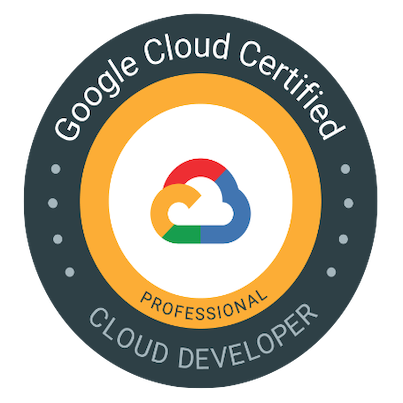

This class is designed to help IT professionals prepare for the Google Professional Cloud Developer certification exam.
This Track Includes:
Developing Applications with Google Cloud – 3 Days
Duration
3 Days
Description:
Learn how to design, develop, and deploy applications that seamlessly integrate components from the Google Cloud ecosystem. This course uses lectures, demos, and hands-on labs to show you how to use Google Cloud services and pre-trained machine learning APIs to build secure, scalable, and intelligent cloud-native applications.
Objectives:
This course teaches participants the following skills:
- Use best practices for application development.
- Choose the appropriate data storage option for application data.
- Implement federated identity management.
- Develop loosely coupled application components or microservices.
- Integrate application components and data sources.
- Debug, trace, and monitor applications.
- Perform repeatable deployments with containers and deployment services.
- Choose the appropriate application runtime environment; use Google Container Engine as a runtime environment and later switch to a no-ops solution with Google App Engine flexible environment.
Course Outline:
The course includes presentations, demonstrations, and hands-on labs.
Module 1: Best Practices for Application Development
- Code and environment management.
- Design and development of secure, scalable, reliable, loosely coupled application components and microservices.
- Continuous integration and delivery.
- Re-architecting applications for the cloud.
Module 2: Google Cloud Client Libraries, Google Cloud SDK, and Google Firebase SDK
- How to set up and use Google Cloud Client Libraries, Google Cloud SDK, and Google Firebase SDK.
- Lab: Set up Google Client Libraries, Cloud SDK, and Firebase SDK on a Linux instance and set up application credentials.
Module 3: Overview of Data Storage Options
- Overview of options to store application data.
- Use cases for Google Cloud Storage, Cloud Firestore, Cloud Bigtable, Google Cloud SQL, and Cloud Spanner.
Module 4: Best Practices for Using Cloud Firestore
- Best practices related to using Cloud Firestore in Datastore mode for:Queries, Built-in and composite indexes, Inserting and deleting data (batch operations),Transactions,Error handling.
- Bulk-loading data into Cloud Firestore by using Google Cloud Dataflow.
- Lab: Store application data in Cloud Datastore.
Module 5: Performing Operations on Cloud Storage
- Operations that can be performed on buckets and objects.
- Consistency model.
- Error handling.
Module 6: Best Practices for Using Cloud Storage
- Naming buckets for static websites and other uses.
- Naming objects (from an access distribution perspective).
- Performance considerations.
- Setting up and debugging a CORS configuration on a bucket.
- Lab: Store files in Cloud Storage.
Module 7: Handling Authentication and Authorization
- Cloud Identity and Access Management (IAM) roles and service accounts.
- User authentication by using Firebase Authentication.
- User authentication and authorization by using Cloud Identity-Aware Proxy.
- Lab: Authenticate users by using Firebase Authentication.
Module 8: Using Pub/Sub to Integrate Components of Your Application
- Topics, publishers, and subscribers.
- Pull and push subscriptions.
- Use cases for Cloud Pub/Sub.
- Lab: Develop a backend service to process messages in a message queue.
Module 9: Adding Intelligence to Your Application
- Overview of pre-trained machine learning APIs such as Cloud Vision API and Cloud Natural Language Processing API.
Module 10: Using Cloud Functions for Event-Driven Processing
- Key concepts such as triggers, background functions, HTTP functions.
- Use cases.
- Developing and deploying functions.
- Logging, error reporting, and monitoring.
Module 11: Managing APIs with Cloud Endpoints
- Open API deployment configuration.
- Lab: Deploy an API for your application.
Module 12: Deploying Applications
- Creating and storing container images.
- Repeatable deployments with deployment configuration and templates.
- Lab: Use Deployment Manager to deploy a web application into Google App Engine flexible environment test and production environments.
Module 13: Execution Environments for Your Application
- Considerations for choosing an execution environment for your application or service:Google Compute Engine (GCE),Google Kubernetes Engine (GKE), App Engine flexible environment, Cloud Functions, Cloud Dataflow, Cloud Run.
- Lab: Deploying your application on App Engine flexible environment.
Module 14: Debugging, Monitoring, and Tuning Performance
- Application Performance Management Tools.
- Stackdriver Debugger.
- Stackdriver Error Reporting.
- Lab: Debugging an application error by using Stackdriver Debugger and Error Reporting.
- Stackdriver Logging.
- Key concepts related to Stackdriver Trace and Stackdriver Monitoring.
- Lab: Use Stackdriver Monitoring and Stackdriver Trace to trace a request across services, observe, and optimize performance.
Audience.
Application developers who want to build cloud-native applications or redesign existing applications that will run on Google Cloud Platform
Prerequisites
Familiarity with application development, systems operations, Linux operating systems, and data analytics/machine learning is helpful in understanding the technologies covered.
Certification
Google Cloud Certified – Professional Cloud Developer
Below is a Course Schedule for this:
2024
| Jan | Feb | Mar | Apr | May | Jun |
|---|---|---|---|---|---|
| 17,18,19 | 21,22,23 | 20,21,22 | 24,25,26 | 29,30,31 | 26,27,28 |
| July | Aug | Sep | Oct | Nov | Dec |
|---|---|---|---|---|---|
| 12,13,14 | 16,17,18 | 20,21,22 | 18,19,20 | 15,16,17 | 13,14,15 |
Duration: 4 Days
Course Fee
| Course Fee | $2250.00 |
| SME (Company Sponsored) – All Singaporean and Permanent Resident Employee | $ |
| Singapore Citizens aged 40 years old and above | $ |
| Singapore Citizen and Permanent Resident aged 21 years old and above | $ |